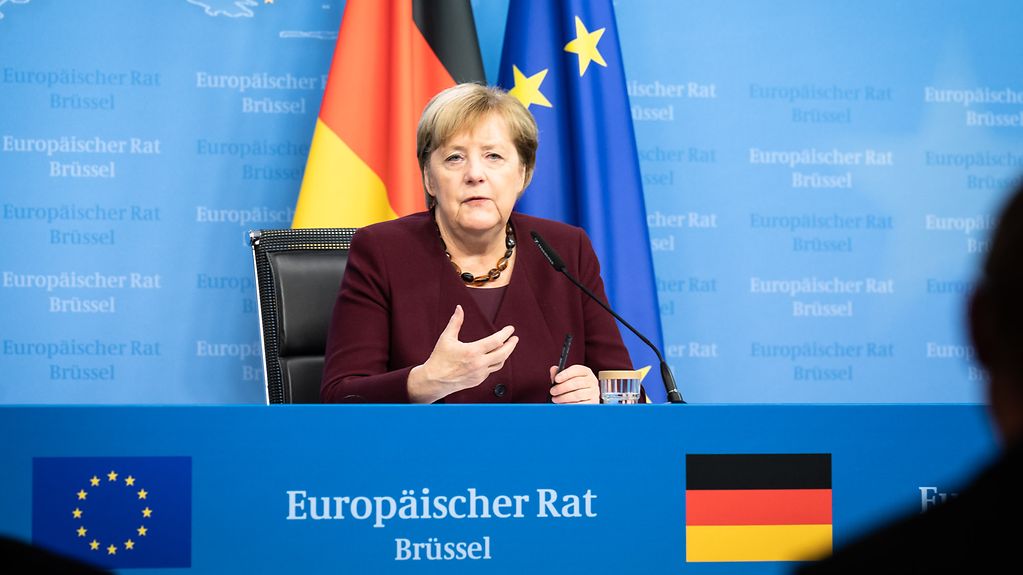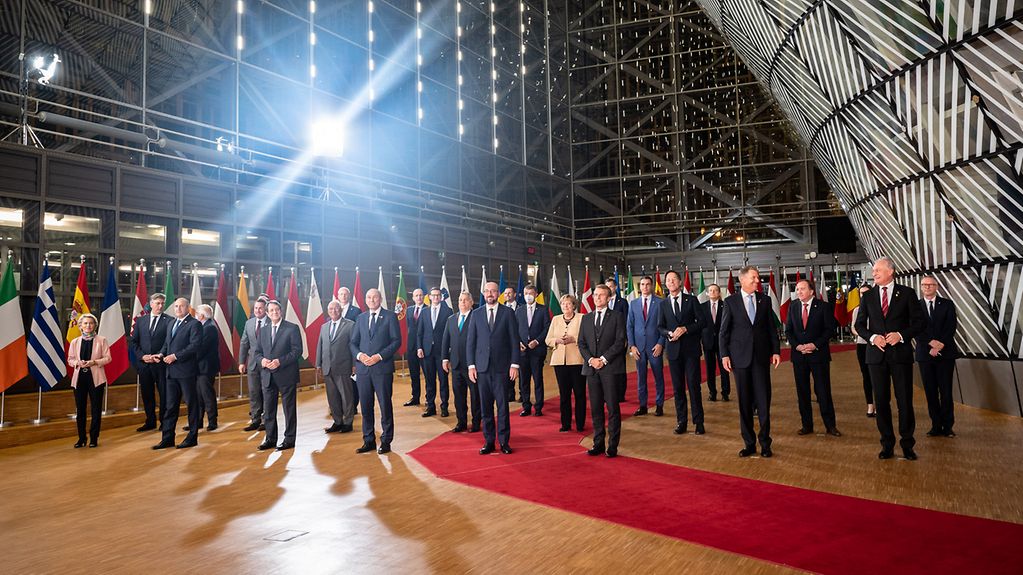European Council
EU leaders discussed migration and the rule of law at the European Council. Referring to Poland, Federal Chancellor Merkel said that an independent judiciary was a “core pillar of European values”, though political dialogue was important too, she added. Other topics included energy prices, trade policy and the digital transformation.
4 min reading time

Federal Chancellor Merkel in Brussels: “Excellent cooperation at all times of the day and night.”
Photo: Federal Government/Steins
The issue of the rule of law was put on the agenda of the European Council in Brussels at short notice in view of the current situation in Poland. The reason for this was the latest verdict by the Polish Constitutional Court, which ruled on 7 October that elements of EU law violated the country’s constitution.
According to Federal Chancellor Angela Merkel at a press conference held at the end of the summit, it was not possible to solve the problem by legal means alone, it was “a political task”, too. “There was broad agreement on the Council that political dialogue, a proper sense of perspective and respectful dealings with each other are crucial factors when it comes to resolving such complex issues.”
Given the numerous instances of legal action against Poland before the European Court of Justice, the heads of state and government pledged to support the Commission as the guardian of the EU treaties.
Energy prices must not hinder the restructuring of energy supply
Rising energy prices were also a key issue at the summit. Last Wednesday, the European Commission proposed measures to tackle the global increase in energy prices to provide help for individuals and companies in Europe.
The causes have much to do with the global growth phase that has followed COVID-19, said the Federal Chancellor. This is why the current temporary price increases should be kept separate from any debate on climate change and the “Fit for 55” package of measures, she added. The transformation of our energy supply “must be geared towards climate neutrality and not be hindered by temporary price increases of this nature”, warned the Federal Chancellor.
EU energy ministers are due to discuss this issue further at an extraordinary meeting on 26 October. The European Council will also continue to monitor the situation and revisit the issue at the December summit.
Migration: new explosive situation at the EU’s external border with Belarus
The issue of migration was also on the agenda of the heads of state and government. The situation has become even more explosive due to the hybrid actions taken by the President Lukashenko of Belarus. “Lukashenko is instrumentalising people as political pawns,” said the Federal Chancellor. Poland, Lithuania and Germany were particularly affected by irregular migration, she added. In its conclusions, the European Council announced the possibility of further sanctions against Belarus.
Secondary migration was also a topic of discussion, including the EU-Turkey agreement and relations with countries in Africa as well as with Egypt, Jordan and Lebanon. “Our co-existence within the Schengen area is of course based on effective protection of the external borders while at the same time respecting our own legal frameworks and international law,” said the Federal Chancellor.

The issue of migration was also on the agenda of the heads of state and government.
Photo: Federal Government/Steins
Coronavirus pandemic: average vaccination rate of 65 percent
The current pandemic situation was another subject discussed by the heads of state and government. Deliberations here focused on the issue of vaccine donations. As a continent, Europe has already exported one billion doses to date. “This puts us in a very good position worldwide,” said Merkel. What is more, the average vaccination rate of 65 percent in the European Union was the highest in the world, she added. “So in spite of the difficulties we’ve had to face, there are some things for us to be quite proud of, too,” said the Federal Chancellor.
Fast-tracking trade policy and the digital transformation
On Thursday evening, leaders also held a general debate on EU trade policy strategy. When it comes to European sovereignty and the EU’s role in the globalised world, “trade is one of our strategic options”, said Merkel, though she also lamented the fact that “trade agreements take too long to ratify”. This was a failing that had to be overcome, she said.
The last item to be discussed by the heads of state and government on Friday was digitalisation. Implementation of the Digital Compass 2030 is vital in terms of driving forward the digital agenda: this requires various laws to be passed, such as the Digital Services Act and the Digital Markets Act. Time was of the essence here, said the Federal Chancellor. In Germany’s view, the Commission's proposals were not ambitious enough in some areas, added Merkel: “We need innovation-friendly regulation in the European Union,” she said.
At what is likely to be her last press conference after a European Council meeting, the Federal Chancellor once again expressed her gratitude “for the excellent cooperation at all times of the day and night – that’s what Europe is all about.”